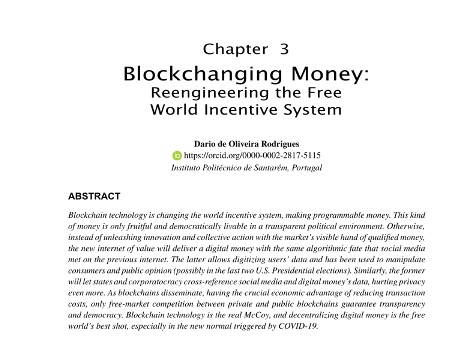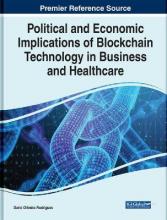“Blockchanging Money: Reengineering the Free World Incentive System”
8 Jul
The third chapter of the book “Political and Economic Implications of Blockchain Technology in Business and Healthcare” discusses money’s essence, arguing that cryptocurrencies can be considered real money from a market perspective despite having no intrinsic value. As seen throughout the chapter, digital money bring together characteristics and technical attributes of traditional money with comparative advantages. But the resemblance ends here because, unlike conventional currencies, cryptocurrencies are programmable enough to incorporate the productive factors “labor” and “capital” in the same unit of account for the first time in history. This financial chimera puts humankind on the verge of a multidimensional monetary system that integrates social and individual incentives. Such a new architecture of financial incentives may induce socially desired behaviors in producers and consumers as the crypto economy will make it possible to use digital tokens to foster collective action in a decentralized way (without resemblances with collectivism). By providing the free market’s invisible hand with cryptographic credentials, which can reconcile transparency with privacy, making this hand visible to society, it will always be possible to squeeze it while hiding nothing. Such conspicuous deals will promote the alignment between human ingenuity, ambition, and merit on the one hand and ethical entrepreneurship socially endorsed by human values on the other. This collective action will only be possible with the unrestricted use of private cryptographic keys. Besides protecting privacy, such personal codes can unleash free initiative and innovation, enabling civil society to create digital tokens that indivisibly act as personal and collective incentives. Hopefully, by rewarding individuals and nurturing social synergies in community ecosystems, it will be possible to avoid turning digital money into surveillance money in the harsh political environment of the post-Covid-19 new normal (see chapter 4 ).

To access the remaining pages, submit such request through the email address dariooliveirarodrigues@gmail.com. Thanks.
How to cite (APA):
Rodrigues, D. D. (2021). Blockchanging Money: Reengineering the Free World Incentive System. In D. Rodrigues (Eds.), Political and Economic Implications of Blockchain Technology in Business and Healthcare (pp. 69-117). IGI Global. http://doi:10.4018/978-1-7998-7363-1.ch003
We know that Internet users’ data were made public and handled by Big Tech companies. However, people’s data, including their money, can now be cyphered and managed by either community-based consensuses, third parties, or the state. Hence, political stances regarding digital decentralization will make or break privacy, freedom, and democracy.



No comments yet